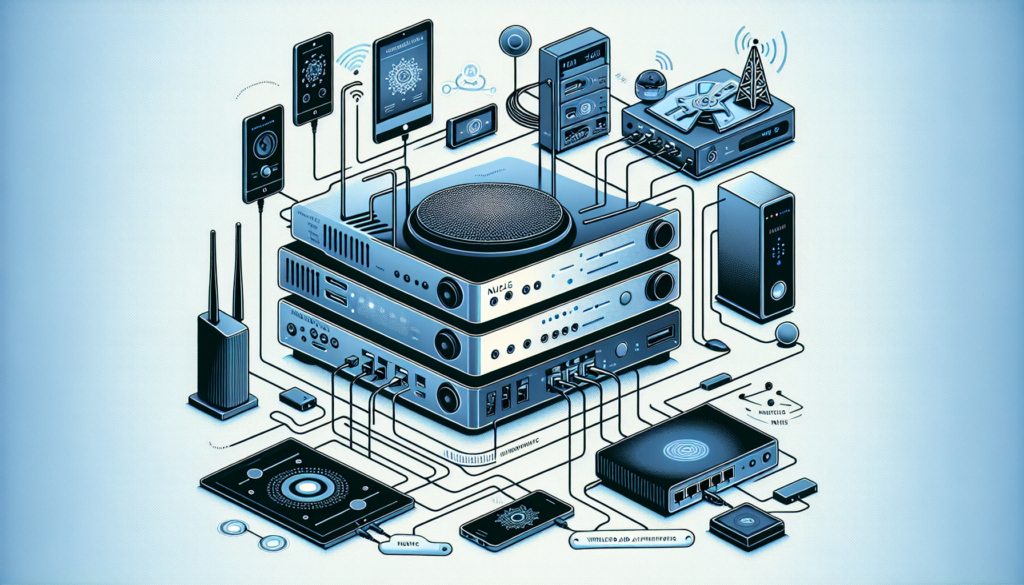Roon nucleus, a revolutionary music player and server, offers seamless integration with a variety of networks, ensuring smooth and uninterrupted listening experiences. You may wonder, does Roon nucleus work with WiFi? Well, the answer is yes! This impressive device is compatible with both wired Ethernet connections and reliable WiFi networks. Whether you prefer the convenience of wireless connectivity or the stability of a wired setup, Roon nucleus has you covered, allowing you to enjoy your favorite music in any setting.
What is Roon nucleus?
Definition of Roon nucleus
Roon nucleus is a dedicated music server that is designed to optimize your listening experience. It acts as the brain of your high-quality audio setup, allowing you to organize, stream, and control your entire music collection with ease. The Roon nucleus software provides a user-friendly interface that lets you access and play music from multiple sources, including local files, streaming services, and internet radio stations. Whether you’re a casual music listener or an audiophile, Roon nucleus offers a seamless and immersive audio experience.
Features of Roon nucleus
Roon nucleus is packed with numerous features that enhance the way you enjoy music. Some of its key features include:
1. Library Management: Roon nucleus provides powerful tools for organizing your music library. It automatically identifies and tags your music files with rich metadata, including artist, album, genre, and more. This makes it easy to search and browse your collection, whether you have hundreds or thousands of tracks.
2. Multi-Room Audio: With Roon nucleus, you can sync and control multiple audio zones in your home. Whether you have speakers in different rooms or a multi-channel setup, Roon nucleus allows you to play music seamlessly across all connected devices. You can group zones together, adjust volume levels, and even create custom playlists for each room.
3. High-Quality Audio Playback: Roon nucleus supports high-resolution audio formats, including FLAC, DSD, and MQA. It can stream lossless audio to compatible devices, ensuring that you experience the true fidelity of your music collection. Roon nucleus also offers advanced signal processing capabilities, such as audio upsampling and room correction, to optimize the sound quality in your listening environment.
4. Integration with Streaming Services: Roon nucleus integrates seamlessly with popular streaming services like TIDAL and Qobuz. This means you can access millions of tracks from these platforms directly within the Roon nucleus interface. The software provides a unified view of your music library and streaming content, making it easy to discover new songs and create personalized playlists.
5. Cross-Platform Compatibility: Roon nucleus is available for various operating systems, including Windows, macOS, and Linux. It also supports a wide range of devices, from high-end audio equipment to smartphones and tablets. This ensures that you can enjoy Roon nucleus on your preferred devices without any compatibility issues.
Why is Roon nucleus popular?
Roon nucleus has gained popularity among music enthusiasts for several reasons. One of the main reasons is its intuitive user interface and powerful music management features. The software’s ability to automatically organize and tag music files saves users from the tedious task of manually curating their library. Additionally, Roon nucleus’s support for multi-room audio and seamless integration with streaming services offers a convenient and immersive music playback experience.
Another factor contributing to Roon nucleus’s popularity is its commitment to high-quality audio. Audiophiles appreciate the software’s support for lossless audio formats and advanced signal processing capabilities. Roon nucleus allows users to optimize their listening environment and enjoy music with exceptional detail and clarity.
Furthermore, Roon nucleus’s cross-platform compatibility and wide device support contribute to its popularity. Whether you prefer using a Windows PC, a macOS laptop, or a Linux-based server, Roon nucleus has you covered. The software also works seamlessly with a variety of audio equipment, ensuring that users can leverage their existing setups without any hassle.
Overall, Roon nucleus stands out as a comprehensive and user-friendly solution for music enthusiasts. Its combination of powerful features, high-quality audio playback, and cross-platform compatibility make it a popular choice for those seeking a seamless and immersive music listening experience.
Network Requirements for Roon nucleus
Wired Network
A wired network connection is recommended for optimal performance when using Roon nucleus. This involves connecting the Roon nucleus server directly to your router or network switch using an Ethernet cable. A wired connection offers several advantages, including increased stability, lower latency, and higher bandwidth compared to Wi-Fi.
When setting up Roon nucleus on a wired network, ensure that you have an available Ethernet port on your router or network switch. Connect one end of the Ethernet cable to the Ethernet port of the Roon nucleus server and the other end to the available Ethernet port on your router or network switch. This will establish a direct and reliable connection between Roon nucleus and your network infrastructure.
WiFi Network
While a wired network connection is recommended, Roon nucleus also supports wireless connectivity via Wi-Fi. However, using Roon nucleus on a Wi-Fi network can introduce certain limitations and potential performance issues compared to a wired connection.
When setting up Roon nucleus on a Wi-Fi network, ensure that your Wi-Fi network meets the minimum requirements for seamless operation. These requirements include a stable and robust Wi-Fi signal, ample network bandwidth, and low interference from other devices or neighboring networks.
Ethernet Connection vs. WiFi Connection
When deciding between an Ethernet connection and a Wi-Fi connection for Roon nucleus, there are a few factors to consider. While Ethernet provides a more stable and reliable connection, Wi-Fi offers greater flexibility in terms of device placement. If your Roon nucleus server is located in close proximity to your router or network switch, an Ethernet connection is recommended for optimal performance. On the other hand, if your Roon nucleus server is in a different room or area where running an Ethernet cable is impractical, Wi-Fi can be a viable option.
Remember that the performance of a Wi-Fi connection can vary depending on the network infrastructure, distance from the router, and the number of connected devices. If you choose to use Wi-Fi, ensure that you have a strong and stable signal in the area where Roon nucleus is located. Additionally, consider using newer Wi-Fi standards, such as Wi-Fi 5 (802.11ac) or Wi-Fi 6 (802.11ax), which offer improved performance and support for multiple devices.
Ultimately, the choice between an Ethernet connection and a Wi-Fi connection for Roon nucleus depends on your specific setup and requirements. It is recommended to prioritize a wired connection whenever possible for the best performance and stability.

Compatible Networks for Roon nucleus
Ethernet Network
An Ethernet network is the most common and widely supported type of network for Roon nucleus. It involves connecting your Roon nucleus server directly to your router or network switch using an Ethernet cable. Ethernet networks provide a stable and reliable connection, ensuring optimal performance when using Roon nucleus. This type of network is ideal for users who prioritize stability and want to maximize the capabilities of their Roon nucleus setup.
WiFi 4 (802.11n) Network
Roon nucleus is compatible with WiFi 4 (802.11n) networks, which offer reliable wireless connectivity. WiFi 4 networks provide adequate performance for streaming music, especially when used in conjunction with a stable and strong Wi-Fi signal.
WiFi 5 (802.11ac) Network
WiFi 5 (802.11ac) networks offer improved performance over previous Wi-Fi standards, making them a great choice for Roon nucleus. These networks provide higher speeds and lower latency, enabling seamless streaming of high-quality audio to compatible devices. WiFi 5 networks are recommended for users who prioritize faster and more reliable wireless connections.
WiFi 6 (802.11ax) Network
WiFi 6 (802.11ax) networks are the latest and most advanced Wi-Fi standard currently available. These networks offer even higher speeds, lower latency, and improved capacity compared to previous standards. WiFi 6 is ideal for users who require the best wireless performance and want to future-proof their Roon nucleus setup. With WiFi 6, you can expect faster and more stable connections, especially in environments with multiple devices competing for bandwidth.
Dual-Band vs. Single-Band Networks
When choosing a compatible network for Roon nucleus, it’s important to consider whether you have a dual-band or single-band network. Dual-band networks operate on both the 2.4GHz and 5GHz frequency bands, while single-band networks operate only on the 2.4GHz band. While both types of networks can work with Roon nucleus, dual-band networks offer greater flexibility and potentially better performance.
Dual-band networks allow you to separate audio streaming traffic from other devices that may be connected to the same network. This can help minimize interference and improve the overall network performance for Roon nucleus. Additionally, the 5GHz band of dual-band networks typically offers faster speeds and lower latency compared to the 2.4GHz band. If your devices support dual-band connectivity, it is recommended to use the 5GHz band for Roon nucleus to ensure the best performance.
Setting up Roon nucleus on a Wired Network
Connect Roon nucleus to your Router
To set up Roon nucleus on a wired network, follow these steps:
- Ensure that your Roon nucleus server is turned off.
- Connect one end of an Ethernet cable to the Ethernet port of the Roon nucleus server.
- Connect the other end of the Ethernet cable to an available Ethernet port on your router or network switch.
- Power on the Roon nucleus server.
- Allow the Roon nucleus server to establish a network connection by checking the status indicators on the server or using the Roon software interface.
By connecting Roon nucleus to your router or network switch via Ethernet, you establish a direct and reliable connection that ensures optimal performance and stability of your Roon nucleus setup.
Wired Connection between Roon nucleus and other Audio Devices
If you have other audio devices that you want to connect to Roon nucleus, you can use a wired connection to ensure the best audio quality and performance. This is especially recommended for devices that support Ethernet connectivity.
To establish a wired connection between Roon nucleus and other audio devices, follow these steps:
- Connect an Ethernet cable from the Ethernet port of the audio device to an available Ethernet port on your router or network switch.
- In the Roon software interface, navigate to the audio device settings and make sure that the device is recognized and set up for use with Roon nucleus.
- Test the connection by playing music through the audio device from Roon nucleus.
By using a wired connection between Roon nucleus and your audio devices, you minimize potential latency and stability issues that can occur with wireless connections. This ensures that you can enjoy your music with optimal sound quality and minimal interruptions.

Setting up Roon nucleus on a WiFi Network
Roon nucleus Compatibility with WiFi
Roon nucleus is compatible with WiFi networks, allowing you to enjoy the benefits of wireless connectivity for your music playback. While a wired network connection is recommended for optimal performance, setting up Roon nucleus on a WiFi network can be a convenient option in certain situations.
Make sure that your WiFi network meets the minimum requirements for Roon nucleus compatibility. This includes having a stable and robust WiFi signal, ample network bandwidth, and low interference from other devices or neighboring networks. Additionally, consider using a WiFi network that supports higher standards, such as WiFi 5 (802.11ac) or WiFi 6 (802.11ax), for better performance.
Ensuring a Stable WiFi Connection
To ensure a stable WiFi connection for Roon nucleus, consider the following tips:
- Place your Roon nucleus server and WiFi router in close proximity to each other to minimize signal loss and interference.
- If possible, connect your WiFi router and Roon nucleus server to a power source with backup power or a uninterruptible power supply (UPS) to prevent network disruptions caused by power outages.
- Avoid placing your Roon nucleus server or WiFi router near sources of interference, such as microwave ovens, cordless phones, or other electronic devices that operate on the same frequency band.
- If you experience weak WiFi signals in certain areas of your home, consider using WiFi extenders or mesh network systems to improve coverage and signal strength.
By following these tips, you can ensure a stable and reliable WiFi connection for Roon nucleus, minimizing potential interruptions or performance issues.
WiFi Network Settings for Roon nucleus
When setting up Roon nucleus on a WiFi network, consider adjusting the following WiFi network settings to optimize performance:
- Enable Band Steering: If your WiFi router supports band steering, enable it to automatically direct devices to the best available frequency band (2.4GHz or 5GHz). This can help ensure that Roon nucleus and other devices are connected to the optimal WiFi band for the best performance.
- Choose the Optimal WiFi Channel: Use a WiFi analyzer tool to identify the least congested WiFi channel in your area. Adjust your WiFi router settings to use the recommended channel, which can help minimize interference and improve the stability and speed of your WiFi network.
- Enable Quality of Service (QoS): Many modern WiFi routers and access points have QoS settings that allow you to prioritize certain types of network traffic, such as audio streaming from Roon nucleus. Enable QoS and prioritize Roon nucleus to ensure a smooth and uninterrupted music playback experience.
- Update Firmware: Regularly check for firmware updates for your WiFi router. Firmware updates often include bug fixes, security patches, and performance optimizations that can improve the overall stability and performance of your WiFi network.
By adjusting these WiFi network settings, you can optimize the performance of Roon nucleus on your WiFi network and ensure a seamless music streaming experience.
Optimizing Network Performance for Roon nucleus
Network Speed and Bandwidth
To optimize network performance for Roon nucleus, ensure that you have sufficient network speed and bandwidth. Higher network speeds allow for smoother music streaming, especially when playing high-resolution audio or streaming to multiple devices simultaneously. Consider upgrading your internet plan to a higher speed if you regularly encounter buffering or slow loading times when using Roon nucleus.
Additionally, check your network bandwidth usage and ensure that it is not being overly saturated by other devices or activities. Bandwidth-hungry applications and simultaneous downloads can impact the performance of Roon nucleus. Prioritize Roon nucleus and multimedia streaming traffic by limiting the bandwidth allocated to other devices or applications, if necessary.
Quality of Service (QoS) Settings
Quality of Service (QoS) settings can be enabled on some routers to prioritize network traffic for Roon nucleus. By assigning higher priority to Roon nucleus data packets, you can ensure a smoother music streaming experience, even when other devices on the network are using bandwidth-intensive applications. Enable QoS on your router and configure it to prioritize Roon nucleus traffic for optimal performance.
Network Placement and Signal Strength
Proper network placement and signal strength are crucial for optimal network performance with Roon nucleus. Ensure that your Roon nucleus server, WiFi router, and other audio devices are placed in strategic locations to minimize signal interference and maximize signal strength. Consider the following tips:
- Place your Roon nucleus server and WiFi router in a central location in your home to ensure even coverage throughout.
- Avoid placing your Roon nucleus server or WiFi router near dense walls, metal surfaces, or other obstructions that may interfere with the WiFi signal.
- If you have multiple audio zones, distribute your audio devices strategically throughout your home to ensure adequate signal coverage and minimize dead zones.
By optimizing network placement and maximizing signal strength, you can minimize potential signal loss or interference, resulting in a more reliable and stable network connection for Roon nucleus.
Using Mesh Networks for Roon nucleus
Mesh networks are an excellent option for optimizing network performance for Roon nucleus, especially in larger homes or areas with multiple audio zones. Mesh networks consist of multiple interconnected access points that provide seamless coverage throughout your home, ensuring a strong and reliable network connection.
By using a mesh network, you can eliminate Wi-Fi dead zones and maintain a consistent signal strength for Roon nucleus and other devices. Mesh networks also offer easy setup and management through a unified interface, allowing you to monitor and optimize network performance for Roon nucleus from a central location.
Consider investing in a mesh network system to maximize the performance and coverage of your Roon nucleus setup, especially if you require a robust and reliable network connection across your entire home.
Troubleshooting Network Issues with Roon nucleus
Interference and Signal Loss
Interference and signal loss can impact the performance of Roon nucleus. If you experience issues such as buffering, dropouts, or poor audio quality, consider the following troubleshooting steps:
- Check for nearby sources of interference, such as other electronic devices operating on the same frequency as your WiFi network. Move or disconnect these devices to minimize interference.
- Ensure that your Roon nucleus server, WiFi router, and other audio devices are placed away from dense walls or obstructions that can block or weaken the WiFi signal. Adjust the placement of your devices to maximize signal strength and reduce potential signal loss.
Firewall and Port Forwarding
Firewalls and port forwarding settings on your network can impact the connectivity of Roon nucleus. If you experience issues with Roon nucleus not being able to discover or connect to your audio devices, consider the following troubleshooting steps:
- Check your firewall settings to ensure that Roon nucleus is allowed to communicate through your network.
- Enable necessary port forwarding for Roon nucleus on your router. Refer to the Roon documentation or support resources for the specific ports that need to be forwarded.
Router Compatibility and Firmware Updates
Router compatibility and outdated firmware can lead to connectivity issues with Roon nucleus. If you encounter problems with Roon nucleus not functioning properly or being unable to establish a reliable network connection, consider the following troubleshooting steps:
- Ensure that your router is compatible with Roon nucleus. Check the Roon website or consult their support resources for a list of compatible routers.
- Update your router’s firmware to the latest version. Firmware updates often include bug fixes and performance improvements that can resolve issues with Roon nucleus compatibility and connectivity.
By troubleshooting and addressing these common network issues, you can ensure a smooth and trouble-free experience with Roon nucleus.
Conclusion
Roon nucleus is a powerful and feature-rich music server that offers a seamless and immersive listening experience. Whether you choose to set up Roon nucleus on a wired network or a WiFi network, ensuring a stable and reliable network connection is crucial for optimal performance.
By considering the network requirements, compatible networks, and network optimization techniques outlined in this article, you can set up and optimize Roon nucleus to enjoy high-quality audio playback throughout your home. Troubleshooting common network issues can also help you resolve any connectivity or performance problems that may arise.
With its intuitive interface, library management features, and support for high-resolution audio, Roon nucleus is the perfect companion for music enthusiasts who want to elevate their listening experience. Set up your Roon nucleus server on the right network and enjoy your favorite music like never before.



